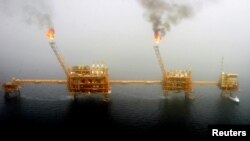Iran has launched an inspection of security at its key Persian Gulf oil and gas facilities, including preparedness for cyberattacks, the Oil Ministry news agency SHANA said, following media reports of Washington weighing possible cyberattacks on Tehran.
U.S. media reports have said the United States is considering possible cyberattacks against Iran after the Sept. 14 attacks on Saudi oil sites that U.S. officials have blamed on Tehran. The Islamic republic has denied being behind the raids, which were claimed by Yemen's Iran-aligned Houthi group.
Pirouz Mousavi, head of the Pars Special Economic Energy Zone (PSEEZ), inspected the area and met with senior managers, including those in charge of cybersecurity and emergency response, SHANA said Wednesday.
The PSEEZ was set up in 1998 to develop the oil and gas resources in the South Pars field, the world's largest natural gas reservoir. The offshore field is shared between Iran and Qatar, which calls it North Field.
Separately, Gholamreza Jalali, head of civil defense, which is in charge of cybersecurity, called for beefing up security at industrial installations. "Our enemies consider the cyber domain as one of the main areas of threat against nations, especially Iran," the semiofficial news agency Fars quoted Jalali as saying.
After reports on social media last Friday of a cyberattack on some petrochemical and other companies in Iran, a state body in charge of cybersecurity denied there had been a successful attack.
NetBlocks, an organization that monitors internet connectivity, earlier reported "intermittent disruptions" to some internet services in Iran.
Iran said in June that U.S. cyberattacks against Iranian targets had not been successful, after reports the Pentagon had launched a cyberattack to disable the country's rocket launch systems following the downing of a U.S. military drone.
Iran has long been on alert over the threat of cyberattacks by foreign countries. The United States and Israel covertly sabotaged Iran's nuclear program in 2009 and 2010 with the now-famous Stuxnet computer virus, which destroyed Iranian centrifuges that were enriching uranium.













